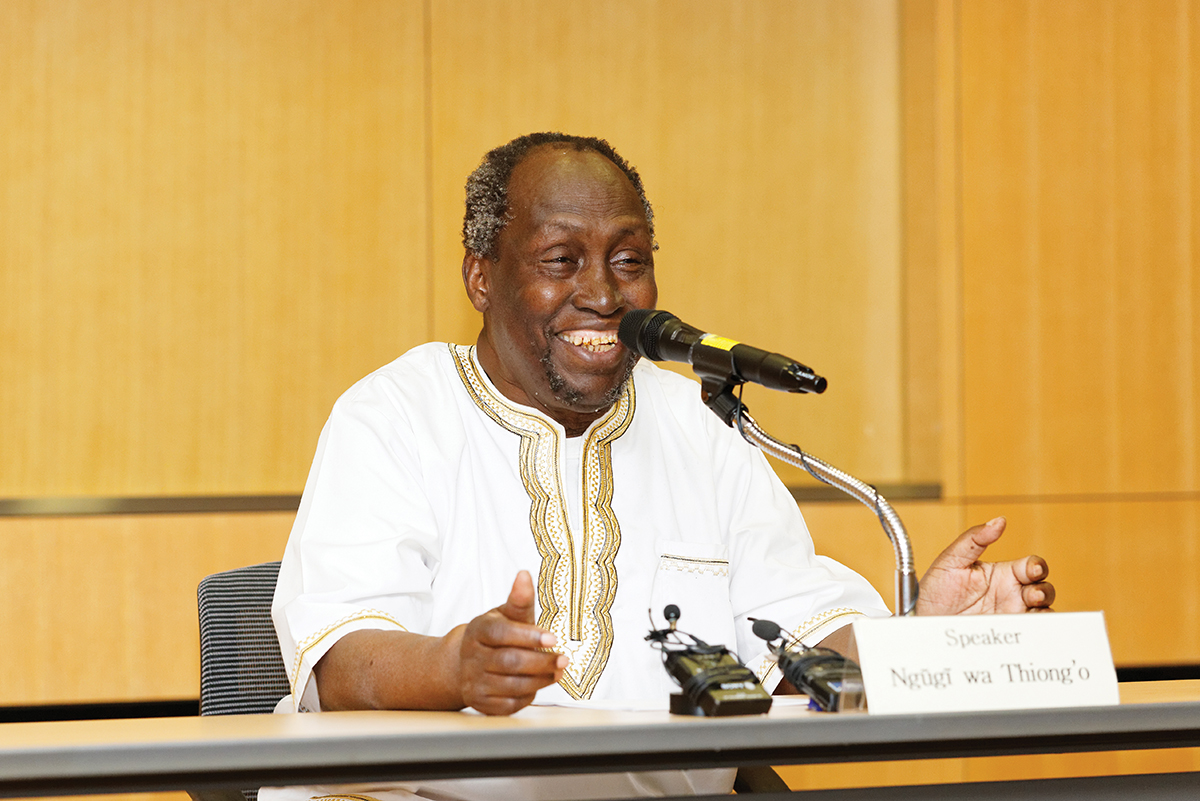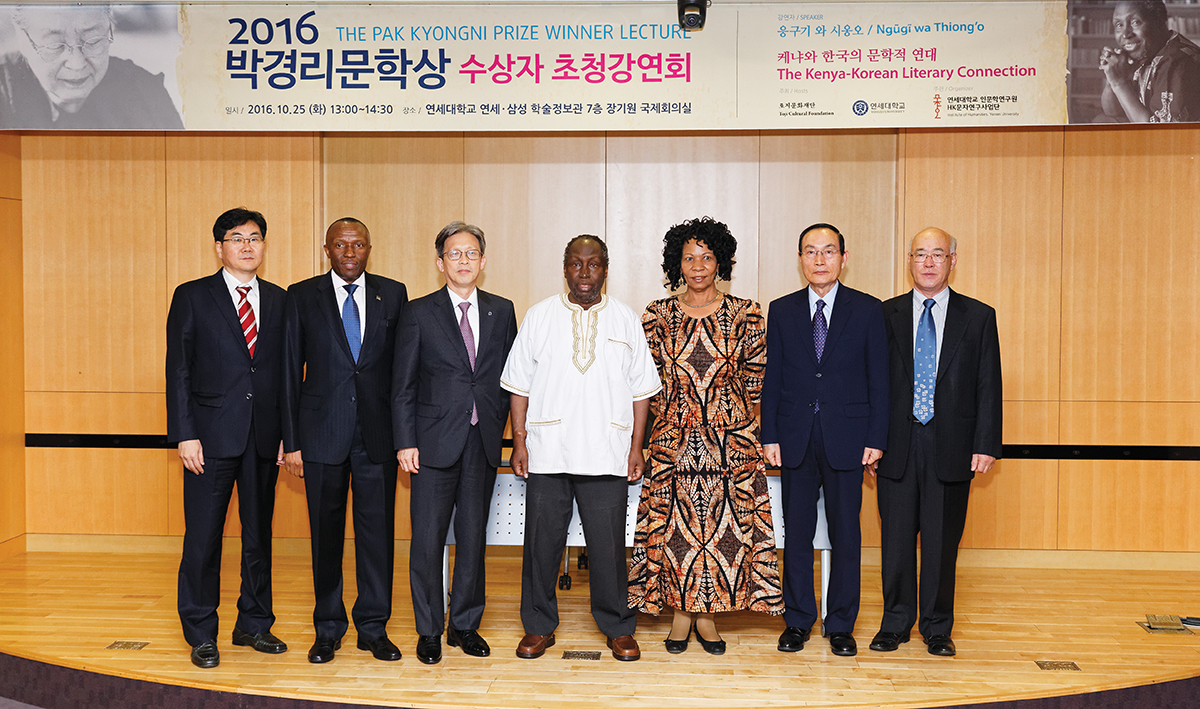Yonsei News
-
[YONSEI NEWS] Ngũgĩ wa Thiong’o Visits Yonsei
연세대학교 홍보팀 / news@yonsei.ac.kr2016-11-21 -
Ngũgĩ wa Thiong’o Visits Yonsei-Recipient of 6th Pak Kyong-ni Literature Award
 Kenyan writer Ngũgĩ wa Thiong’o, a perennial candidate for the Nobel Prize in literature, visited Yonsei October 25 to receive the Pak Kyong-ni Literature Award and give a special lecture on the literary connections of Kenya and Korea. Ngũgĩ is an internationally renowned novelist, dramatist, and critic, and he is currently Distinguished Professor of Comparative Literature and English at the University of California, Irvine.Ngũgĩ’s literary work is deeply marked by his experiences growing up in colonial Kenya, particularly the Mau Mau uprising against British colonial rule, as well as the troubled aftermath of Kenyan independence (for many years, he was exiled from Kenya due to writings considered to be critical of the government). His first novel, Weep Not, Child (1964), about the Mau Mau rebellion was published to great acclaim. His subsequent works include A Grain of Wheat (1967), Petals of Blood (1977), and Decolonising the Mind (1986).The Pak Kyoung-ni Literature Award was established in 2011 in honor of the late Pak Kyong-ni, author of the epic novel Toji, and it is given to writers who have made exceptional contributions to world literature. Ngũgĩ received this year’s prize for representing the historical vicissitudes of African history, transcending linguistic and geographical boundaries while conveying the intricacies of native traditions.
Kenyan writer Ngũgĩ wa Thiong’o, a perennial candidate for the Nobel Prize in literature, visited Yonsei October 25 to receive the Pak Kyong-ni Literature Award and give a special lecture on the literary connections of Kenya and Korea. Ngũgĩ is an internationally renowned novelist, dramatist, and critic, and he is currently Distinguished Professor of Comparative Literature and English at the University of California, Irvine.Ngũgĩ’s literary work is deeply marked by his experiences growing up in colonial Kenya, particularly the Mau Mau uprising against British colonial rule, as well as the troubled aftermath of Kenyan independence (for many years, he was exiled from Kenya due to writings considered to be critical of the government). His first novel, Weep Not, Child (1964), about the Mau Mau rebellion was published to great acclaim. His subsequent works include A Grain of Wheat (1967), Petals of Blood (1977), and Decolonising the Mind (1986).The Pak Kyoung-ni Literature Award was established in 2011 in honor of the late Pak Kyong-ni, author of the epic novel Toji, and it is given to writers who have made exceptional contributions to world literature. Ngũgĩ received this year’s prize for representing the historical vicissitudes of African history, transcending linguistic and geographical boundaries while conveying the intricacies of native traditions. The Kenya-Korean Literary ConnectionIn his special lecture, Ngũgĩ spoke on the topic of “Kenya and Korea’s Literary Solidarity,” addressing the historical consciousness in the literatures of these former colonies, as well as their social criticism and spirit of resistance. Of Korean literature, he said that he “was deeply impressed by Chi-ha Kim’s The Five Bandits,” adding that different languages must meet each other on the basis of equality and mutual respect.Daeho Cho, director of the Yonsei Institute of Humanities, explained the importance of Ngũgĩ’s visit: “This was an opportunity for deep reflection on the problems that confront Korean literature at the moment and the question of world literature. This was made possible by engaging with the literary world of Ngũgĩ wa Thiong’o, who has been a trailblazer in world literature. His works are unique in the way that his literary language and imagination provoke a head-on collision with reality.
The Kenya-Korean Literary ConnectionIn his special lecture, Ngũgĩ spoke on the topic of “Kenya and Korea’s Literary Solidarity,” addressing the historical consciousness in the literatures of these former colonies, as well as their social criticism and spirit of resistance. Of Korean literature, he said that he “was deeply impressed by Chi-ha Kim’s The Five Bandits,” adding that different languages must meet each other on the basis of equality and mutual respect.Daeho Cho, director of the Yonsei Institute of Humanities, explained the importance of Ngũgĩ’s visit: “This was an opportunity for deep reflection on the problems that confront Korean literature at the moment and the question of world literature. This was made possible by engaging with the literary world of Ngũgĩ wa Thiong’o, who has been a trailblazer in world literature. His works are unique in the way that his literary language and imagination provoke a head-on collision with reality.
vol. 123
- vol. All
- vol. 1243
- vol. 1122
- vol. 125
- vol. 124
- vol. 123
- vol. 122
- vol. 121
- vol. 120
- vol. 119
- vol. 118
- vol. 117
- vol. 116
- vol. 115
- vol. 114
- vol. 113
- vol. 112
- vol. 111
- vol. 110
- vol. 109
- vol. 108
- vol. 107
- vol. 106
- vol. 105
- vol. 104
- vol. 103
- vol. 102
- vol. 101
- vol. 100
- vol. 99
- vol. 98
- vol. 97
- vol. 96
- vol. 95
- vol. 94
- vol. 93
- vol. 92
- vol. 91
- vol. 90
- vol. 89
- vol. 88
- vol. 87
- vol. 86
- vol. 85
- vol. 84
- vol. 83
- vol. 82
- vol. 81
- vol. 80
- vol. 79
- vol. 78
- vol. 77
- vol. 76
- vol. 75
- vol. 74
- vol. 73
- vol. 72
- vol. 71
- vol. 70
- vol. 69
- vol. 68
- vol. 67
- vol. 66
- vol. 65
- vol. 64
- vol. 63
- vol. 62
- vol. 61
- vol. 60
- vol. 59
- vol. 58
- vol. 57
- vol. 56
- vol. 55
- vol. 54
- vol. 53
- vol. 52
- vol. 51
- vol. 50
- vol. 49
- vol. 48
- vol. 47
- vol. 46
- vol. 45
- vol. 44
- vol. 43
- vol. 42
- vol. 41
- vol. 40
- vol. 39
- vol. 38
- vol. 37
- vol. 36
- vol. 35
- vol. 34
- vol. 33
- vol. 32
- vol. 31
- vol. 30
- vol. 29
- vol. 28
- vol. 27
- vol. 26
- vol. 25
- vol. 24
- vol. 23
- vol. 22
- vol. 21
- vol. 20
- vol. 19
- vol. 18
- vol. 17
- vol. 16
- vol. 15
- vol. 14
- vol. 13
- vol. 12
- vol. 11
- vol. 10
- vol. 9
- vol. 8
- vol. 7
- vol. 6
- vol. 5
- vol. 4
- vol. 3
- vol. 2
- vol. 1